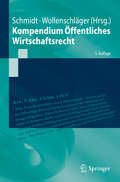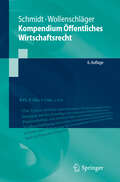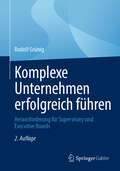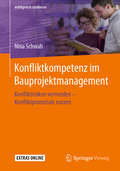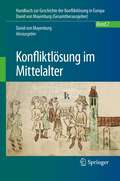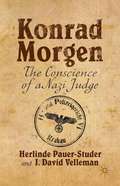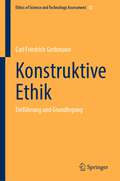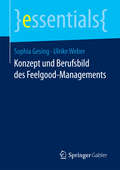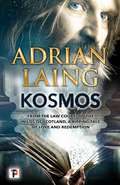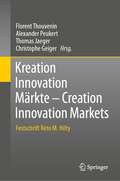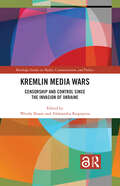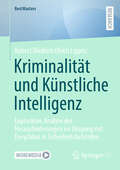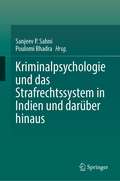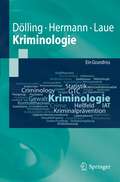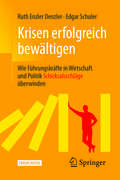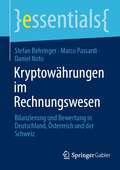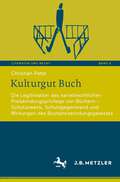- Table View
- List View
Kompendium Öffentliches Wirtschaftsrecht (Springer-Lehrbuch)
by Reiner Schmidt Ferdinand WollenschlägerKompakt, übersichtlich, aktuell und didaktisch auf die spezifischen Lernbedürfnisse der Studierenden zugeschnitten, entfaltet dieses Lehrbuch die vielfältigen und facettenreichen Materien des Öffentlichen Wirtschaftsrechts – ein Rechtsgebiet, das (nicht nur) in der Schwerpunktausbildung an den juristischen Fakultäten von zentraler Bedeutung ist. Auch Wissenschaftlern und Praktikern vermittelt das Kompendium Grundstrukturen und Grundfragen. Das Öffentliche Wirtschaftsrecht regelt das grundsätzliche Verhältnis des Staates zur Wirtschaft, etwa die Modalitäten der Marktteilnahme des Staates auf Anbieter- und Nachfragerseite (Recht öffentlicher Unternehmen bzw. Vergaberecht) oder die Ziele, Instrumente und Grenzen der Regulierung bestimmter Wirtschaftssektoren (z.B. Gaststätten- oder Telekommunikationsrecht). Europäische Integration und Internationalisierung sind insoweit nicht mehr wegzudenken.
Kompendium Öffentliches Wirtschaftsrecht (Springer-Lehrbuch)
by Reiner Schmidt Ferdinand WollenschlägerKompakt, übersichtlich, aktuell und didaktisch auf die spezifischen Lernbedürfnisse der Studierenden zugeschnitten, entfaltet dieses Lehrbuch die vielfältigen und facettenreichen Materien des Öffentlichen Wirtschaftsrechts – ein Rechtsgebiet, das (nicht nur) in der Schwerpunktausbildung an den juristischen Fakultäten von zentraler Bedeutung ist. Auch Wissenschaftlerinnen und Praktikern vermittelt das Kompendium Grundstrukturen und Grundfragen. Das Öffentliche Wirtschaftsrecht regelt das grundsätzliche Verhältnis des Staates zur Wirtschaft, etwa die Modalitäten der Marktteilnahme des Staates auf Anbieter- und Nachfragerseite (Recht öffentlicher Unternehmen bzw. Vergaberecht) oder die Ziele, Instrumente und Grenzen der Regulierung bestimmter Wirtschaftssektoren (z.B. Gaststätten- oder Telekommunikationsrecht). Europäische Integration und Internationalisierung sind insoweit nicht mehr wegzudenken.
Komplexe Unternehmen erfolgreich führen: Herausforderung für Supervisory und Executive Boards
by Rudolf GrünigKomplexe Unternehmen zeichnen sich durch einen hohen Umsatz, eine große Mitarbeiterzahl, viele Produkte und Dienstleistungen, internationale Aktivitäten und eine dezentrale Leistungserstellung aus. Neben der Größe und Vielfältigkeit sind komplexe Unternehmen auch durch eine hohe Umfelddynamik und große interne Veränderungen charakterisiert. Die erfolgreiche Führung eines komplexen Unternehmens ist eine große Herausforderung. Das vorliegende Buch gibt zuerst einen Überblick über die wichtigsten Aufgaben der obersten Führung. Dabei werden drei Kernaufgaben, sechs Analyse- und Gestaltungsaufgaben und zwei Metaaufgaben unterschieden. Anschließend werden die einzelnen Aufgaben kurz und praxisorientiert beschrieben: (1) Bedeutung der Aufgabe (2) Framework und Schilderung der wichtigsten Teilaufgaben (3) Pflichten von Supervisory und Executive Board Das Buch richtet sich in erster Linie an Mitglieder von Supervisory und Executive Boards komplexer Unternehmen. Es kann zudem für Unternehmensberater hilfreich sein. Schließlich eignet es sich als Lehrmittel in Masterprogrammen sowie in Executive Lehrgängen und firmeninternen Programmen für Führungskräfte.
Komplexe Unternehmen erfolgreich führen: Herausforderung für Supervisory und Managing Board
by Rudolf GrünigKomplexe Unternehmen zeichnen sich durch einen hohen Umsatz, eine große Mitarbeiterzahl, viele Produkte und Dienstleistungen, internationale Aktivitäten und eine dezentrale Leistungserstellung aus. Neben der Größe und Vielfältigkeit sind komplexe Unternehmen auch durch eine hohe Umfelddynamik und große interne Veränderungen charakterisiert.Die erfolgreiche Führung eines komplexen Unternehmens ist eine große Herausforderung. Das vorliegende Buch gibt zuerst einen Überblick über die wichtigsten Aufgaben der obersten Führung. Dabei werden drei Kernaufgaben, sechs Analyse- und Gestaltungsaufgaben und zwei Metaaufgaben unterschieden. Anschließend werden die einzelnen Aufgaben kurz und praxisorientiert beschrieben:(1) Bedeutung der Aufgabe(2) Framework und Schilderung der wichtigsten Teilaufgaben(3) Pflichten von Supervisory und Managing BoardDas Buch richtet sich in erster Linie an Mitglieder von Supervisory und Managing Boards komplexer Unternehmen. Es kann zudem für Unternehmensberater hilfreich sein. Schließlich eignet es sich als Lehrmittel in Masterprogrammen sowie in Executive Lehrgängen und firmeninternen Programmen für Führungskräfte.
Konfidenzintervalle und Standardfehler-Balken: Das Konzept verstehen und Ergebnisse angemessen interpretieren (essentials)
by Irasianty FrostDieses essential zeigt die korrekte Anwendung von Konfidenzintervallen und hilft, Fehlinterpretationen derselben zu vermeiden bzw. zu erkennen. Auf die mathematischen Tiefen der Statistik wird bewusst verzichtet. Leser lernen in diesem essential den Begriff und die Bedeutung des Konfidenzintervalls im Kontext der dahinterstehenden Idee von Jerzy Neyman (1894-1981) kennen. Beispiele und Abbildungen erleichtern das Erfassen des Konzepts Konfidenzintervall.
Konfliktkompetenz im Bauprojektmanagement: Konfliktrisiken vermeiden – Konfliktpotenziale nutzen (erfolgreich studieren)
by Nina SchwabDieses Lehrbuch bringt Studierenden die Relevanz des Konfliktmanagements in ihrer zukünftigen Rolle der Projektleitung anhand nationaler und internationaler Vorgaben und Erwartungshaltungen als Schlüsselkompetenz nahe. Es vermittelt Basiswissen zur Konfliktkompetenz durch Grundlagen der Konflikttheorie und der Kommunikation. Aufbauend auf der Differenzierung von Konflikten werden Methoden der Konfliktbearbeitung vorgestellt und über praktische Anwendungen Handlungsoptionen aufgezeigt. Darüber hinaus werden Möglichkeiten der Steuerung von Konflikten, die konkret auf das Baumanagement zugeschnitten sind, erläutert. Dazu gehören u. a. Partizipationsprozesse, Optionen der Vertragsgestaltung und der Aufbau geeigneter Organisations- und Kommunikationsstrukturen. Das Buch berücksichtigt dabei, dass Konfliktkompetenz intensive Arbeit an sich selbst bedeutet, Haltung, Selbstreflexion und in Summe der Aufbau einer entsprechenden Konfliktkultur. Zahlreiche Beispiele sowie Reflexions-, Wissens,- und Praxisaufgaben veranschaulichen und vertiefen den Lernstoff. Das Buch gehört zur Lehrbuchreihe "erfolgreich studieren".
Konfliktlösung im 19. und 20. Jahrhundert (Handbuch zur Geschichte der Konfliktlösung in Europa #4)
by Peter CollinDas vierbändige „Handbuch zur Geschichte der Konfliktlösung in Europa“ beschäftigt sich mit rechtlichen und außerrechtlichen Wegen der Entscheidung von Konflikten zwischen einzelnen Menschen sowie zwischen Personen und ihren Obrigkeiten. Das von Expertinnen und Experten aus vielen europäischen Ländern geschriebene Handbuch soll als zentrales Referenzmedium für die historische Dimension aller Aspekte der Streitentscheidung dienen. Der Aufbau des Werks orientiert sich an den vier Epochen Antike, Mittelalter, Frühe Neuzeit und 19./20. Jahrhundert. Nach einer Einführung in die jeweilige Epoche werden die für den Zeitabschnitt kennzeichnenden Akteure, Verfahren und Institutionen vorgestellt sowie Kernfragen und Zentralprobleme der Streitentscheidung in zeittypischen Konfliktfeldern behandelt. Die europäische Perspektive des Handbuchs schlägt sich in Überblicken zu einzelnen Ländern, Regionen und Rechtskulturen nieder. Ausführliche Hinweise auf die weiterführende Literatur runden die Darstellung ab. Band 4 umfasst Beiträge zum 19. und 20. Jahrhundert.
Konfliktlösung im Mittelalter (Handbuch zur Geschichte der Konfliktlösung in Europa #2)
by David Von MayenburgDas vierbändige „Handbuch zur Geschichte der Konfliktlösung in Europa“ beschäftigt sich mit rechtlichen und außerrechtlichen Wegen der Entscheidung von Konflikten zwischen einzelnen Menschen sowie zwischen Personen und ihren Obrigkeiten. Das von Expertinnen und Experten aus vielen europäischen Ländern geschriebene Handbuch soll als zentrales Referenzmedium für die historische Dimension aller Aspekte der Streitentscheidung dienen.Der Aufbau des Werks orientiert sich an den vier Epochen Antike, Mittelalter, Frühe Neuzeit und 19./20. Jahrhundert. Nach einer Einführung in die jeweilige Epoche werden die für den Zeitabschnitt kennzeichnenden Akteure, Verfahren und Institutionen vorgestellt sowie Kernfragen und Zentralprobleme der Streitentscheidung in zeittypischen Konfliktfeldern behandelt. Die europäische Perspektive des Handbuchs schlägt sich in Überblicken zu einzelnen Ländern, Regionen und Rechtskulturen nieder. Ausführliche Hinweise auf die weiterführende Literatur runden die Darstellung ab. Der vorliegende Band 2 umfasst Beiträge zum Mittelalter.
Konfliktlösung in der Antike (Handbuch zur Geschichte der Konfliktlösung in Europa #1)
by Nadine Grotkamp Anna SeelentagDas vierbändige „Handbuch zur Geschichte der Konfliktlösung in Europa“ beschäftigt sich mit rechtlichen und außerrechtlichen Wegen der Entscheidung von Konflikten zwischen einzelnen Menschen sowie zwischen Personen und ihren Obrigkeiten. Das von Expertinnen und Experten aus vielen europäischen Ländern geschriebene Handbuch soll als zentrales Referenzmedium für die historische Dimension aller Aspekte der Streitentscheidung dienen.Der Aufbau des Werks orientiert sich an den vier Epochen Antike, Mittelalter, Frühe Neuzeit und 19./20. Jahrhundert. Nach einer Einführung in die jeweilige Epoche werden die für den Zeitabschnitt kennzeichnenden Akteure, Verfahren und Institutionen vorgestellt sowie Kernfragen und Zentralprobleme der Streitentscheidung in zeittypischen Konfliktfeldern behandelt. Die europäische Perspektive des Handbuchs schlägt sich in Überblicken zu einzelnen Ländern, Regionen und Rechtskulturen nieder. Ausführliche Hinweise auf die weiterführende Literatur runden die Darstellung ab. Der vorliegende Band 1 umfasst Beiträge zur Antike.
Konfliktlösung in der Frühen Neuzeit (Handbuch zur Geschichte der Konfliktlösung in Europa #3)
by Wim DecockDas vierbändige „Handbuch zur Geschichte der Konfliktlösung in Europa“ beschäftigt sich mit rechtlichen und außerrechtlichen Wegen der Entscheidung von Konflikten zwischen einzelnen Menschen sowie zwischen Personen und ihren Obrigkeiten. Das von Expertinnen und Experten aus vielen europäischen Ländern geschriebene Handbuch soll als zentrales Referenzmedium für die historische Dimension aller Aspekte der Streitentscheidung dienen. Der Aufbau des Werks orientiert sich an den vier Epochen Antike, Mittelalter, Frühe Neuzeit und 19./20. Jahrhundert. Nach einer Einführung in die jeweilige Epoche werden die für den Zeitabschnitt kennzeichnenden Akteure, Verfahren und Institutionen vorgestellt sowie Kernfragen und Zentralprobleme der Streitentscheidung in zeittypischen Konfliktfeldern behandelt. Die europäische Perspektive des Handbuchs schlägt sich in Überblicken zu einzelnen Ländern, Regionen und Rechtskulturen nieder. Ausführliche Hinweise auf die weiterführende Literatur runden die Darstellung ab. Der vorliegende Band 3 umfasst Beiträge zur Frühen Neuzeit.
Konrad Morgen
by Herlinde Pauer-Studer J. David VellemanGeorg Konrad Morgen was a judge in the SS courts, placed in charge of prosecuting crimes committed in Nazi concentration camps, including Buchenwald, Dachau, and Auschwitz. Although delegated by Heinrich Himmler to root out corruption, Morgen remarkably went on to prosecute camp officers for the murder of prisoners. He secured the convictions of several concentration camp commandants, two of whom were executed for their crimes. Yet, despite being face-to-face with the horrors of the Nazi killing machine, he was unable to prosecute anyone for the systematic extermination of the Jews. Instead he tried unsettle the system by seeking an arrest warrant for Adolf Eichmann, albeit for minor offences, and the chief of the Auschwitz gestapo. This is a moral biography of Morgen, focusing on how he felt, thought, and deliberated about the challenges of his unique position. In wartime memos and correspondence, both official and private, as well as his post-war interrogations and his gripping testimonies at war-crimes trials, Morgen's moral and legal reasoning is placed at the fore. What emerges is a deeply equivocal figure whose strong but flawed sense of justice was unequal to the extraordinary circumstances of the Third Reich. Take a look at ourFacebook pagefor more information.
Konstruktion, Berechnung und Eigenschaften des deutschen Einkommensteuertarifs: Praktische Beispiele mit Excel
by Andreas PfeiferDas Buch gibt einen Überblick über alle wichtigen Begriffe rund um den Einkommensteuertarif, wie Grenzsteuersatz oder kalte Progression, um nur zwei zu nennen. Die Begriffe werden nicht nur erklärt, sondern auch mit genauen Berechnungen und Beispielen dargelegt. Das Buch eignet sich für alle, die über den Einkommensteuertarif und dessen Eigenschaften genauer Bescheid wissen wollen oder müssen. Es ist auch für Personen nützlich, die ihre Steuerbeträge – beispielsweise aus dem Jahressteuerbescheid – überprüfen wollen. Interessant ist es ebenso für die Lehre. Nicht nur an Universitäten und Hochschulen kann die Einkommensteuer in Mathematik-Lehrveranstaltungen für Praxis-Beispiele von Funktionen, Ableitungen und Grenzwerte dienen. Aber auch Lehrerinnen und Lehrer an Gymnasien und Berufsschulen können die Einkommensteuer für die Erstellung praxis-bezogener sehr elementarer, aber auch komplizierte Übungsaufgaben für die Sekundarstufe I und II verwenden. Fast die gesamte Analysis kann anhand der Einkommensteuer erklärt und verdeutlicht werden. Es wird nicht nur auf die mathematischen Formeln und deren Herleitung, sondern auch auf viele praktische Beispiele Wert gelegt.
Konstruktive Ethik: Einführung und Grundlegung (Ethics of Science and Technology Assessment #52)
by Carl Friedrich GethmannDas Buch bietet einen systematischen Gesamtentwurf der Allgemeinen Ethik und damit für den interessierten Leser einen Zugang zu den wichtigsten Fragestellungen der Disziplin Ethik. Dazu werden im Anschluß an eine systematische und historische Einleitung propädeutische Fragen behandelt und die bekannten drei Paradigmen ethischer Reflexion (Tugendethik, Nutzenethik und Verpflichtungsethik) in Orientierung an den klassischen Texten dargestellt. Darauf aufbauend wird die mögliche Komplementarität dieser Paradigmen im Sinne eines Filtermodells sukzessiver ethischer Urteilsbildung entwickelt. Das Buch zeigt, ausgehend von den sprachphilosophischen und wissenschaftsphilosophischen Arbeiten der Erlanger Schule, darüber hinaus, daß moralische Verpflichtungen und Berechtigungen mit ihren unterschiedlichen Graden von Verbindlichkeit ohne starke „realistische“ und wertphilosophische Unterstellungen rekonstruiert werden können.
Konzept und Berufsbild des Feelgood-Managements (essentials)
by Ulrike Weber Sophia GesingDieses essential f#65533;hrt in das noch wenig bekannte und verbreitete Konzept des Feelgood-Managements, das vor allem in Start-ups entwickelt wurde, sowie das neue Berufsbild des Feelgood-Managers ein. Es zeigt die Chancen auf, durch Feelgood-Management das Engagement der Mitarbeiter sowie die Unternehmens- und F#65533;hrungskultur positiv zu beeinflussen und dadurch die Wettbewerbsf#65533;higkeit weiter zu steigern. Auch werden die Grenzen des Feelgood-Managements und seine m#65533;gliche Weiterentwicklung skizziert. So m#65533;chte das essential einen fundierten als auch praxisorientierten Zugang zum neuen Werteverst#65533;ndnis von Unternehmen erm#65533;glichen. Dabei wird Fachwissen und Expertise aus HR-Management kompetent integriert und neue Wege des Miteinanders aufgezeigt.
Korean Crisis and Recovery
by David T. Coe Se-Jik KimThis volume contains papers presented at a May 2001 conference in Seoul sponsored by the IMF and the Korea Institute for International Economic Policy on the Korean Crisis and Recovery. The papers examine the response to the 1997 crisis, its long-term impact on growth, and the state of financial and corporate sector reforms. Authors include academics, Korean policymakers, and IMF and World Bank staff involved in the Korean program. [from the IMF website]
Korruption in Deutschland: Ein Überblick über den Stand der Korruptionsforschung seit 1945 (Forum für Verwaltungs‐ und Polizeiwissenschaft)
by Karlhans LieblDas Buch führt die wichtigsten Strömungen der Korruptionsforschung seit 1945 auf. Ein besonderes Augenmerk wird dabei auf die deutsche Forschungslandschaft gelegt. Weitere Schwerpunkte sind die Untersuchungen zum Umfang der Korruption, methdoische Probleme der Erhebung von Daten zur Korruption und Präventionsvorschläge. Letzterer Gesichtspunkt hat wieder einen besonderen Blick auf Deutschland. Abschließend werden die bisherigen Forschungen bewertet und Forderungen für zukünftige Untersuchungen dargelegt.
Kosmos (Fiction Without Frontiers)
by Adrian Laing"Expect the unexpected at every turn of the page. Kosmos is a story like no other. Completely different, charming, and an enormous amount of fun." - Cemetery DanceRookie barrister George Winsome, young and arrogant, defends an old boy who thinks he&’s Merlin on a manslaughter charge. The riotous trial turns Merlin into a celebrity; money, greed and ambition take hold of George and his partner Heather until the secret of Merlin&’s past is revealed as the spirit of Saint Yves intervenes to ensure George and Heather follow their true paths. &‘Kosmos&’ is a modern-day jury trial, a feel-good love story and a spiritual journey involving Saint Yves, Nemesis and Merlin. FLAME TREE PRESS is the new fiction imprint of Flame Tree Publishing. Launching in 2018 the list brings together brilliant new authors and the more established; the award winners, and exciting, original voices.
Kreation Innovation Märkte - Creation Innovation Markets: Festschrift Reto M. Hilty
by Thomas Jaeger Florent Thouvenin Christophe Geiger Alexander PeukertReto M. Hilty hat im europäischen, deutschen und schweizerischen Immaterialgüterrecht tiefe Spuren hinterlassen. Aus Anlass seiner Emeritierung als Direktor des Max-Planck-Instituts für Innovation und Wettbewerb und als Professor ad personam an der Universität Zürich würdigen seine Freunde, Kollegen und Schüler sein Wirken mit dieser Festschrift. Die Bandbreite der Themen und die Vielfalt der Autoren spiegeln die Vielschichtigkeit der Tätigkeiten des Jubilars. Die Festschrift enthält Beiträge zu Grundsatzfragen des IP-Rechts, zum Patent-, Urheber-, Design- und Markenrecht, zum Schutz von Geschäftsgeheimnissen, zum Recht der geographischen Herkunftsangaben sowie zum Kartell- und Lauterkeitsrecht. Ein Schwerpunkt liegt auf den Herausforderungen der Digitalisierung, insb. auf dem Umgang des IP-Rechts mit Daten und Künstlicher Intelligenz (KI).Reto M. Hilty has left a deep mark on European, German and Swiss intellectual property law. On the occasion of his retirement as Directorof the Max-Planck-Institute for Innovation and Competition and as Professor ad personam at the University of Zurich, his friends and colleagues pay tribute to his work with this Festschrift. The range of topics and the variety of authors reflect the impressive spectrum of Reto’s activities. The Festschrift contains contributions on fundamental questions of IP law, on patent, copyright, design and trademark law, on the protection of trade secrets, on the law of geographical indications as well as on antitrust and unfair competition law. One focus is on the challenges of digitalisation, in particular on how IP law deals with data and artificial intelligence (AI).
Kremlin Media Wars: Censorship and Control Since the Invasion of Ukraine (Routledge Studies in Media, Communication, and Politics)
by Wendy Sloane Aleksandra RaspopinaThis unique volume brings together academics of Russian journalism and media with journalists and editors who reported or continue to report on the country, to explore and reflect on the changing landscape for journalists in Russia or covering Russia, and the increasing control exerted by the government on independent journalists.Combining rigorous academic research with reflective practitioner essays, the volume investigates the future of reporting in Russia and the implications for the future of the country. It offers an understanding of the experience of independent journalists and media outlets in Russia, as well as other individuals who experience censorship (academics, activists), and examines how the current situation in Russia and people’s experiences of censorship can inform both our theoretical understandings of censorship and information control, in the context of the twenty‑first‑century digital technologies and the policymaking both inside and outside of Russia.Offering important insight into what is happening within Russia’s borders, this volume will appeal to researchers and students of journalism, political science, international relations, propaganda and censorship, mass media, as well as journalists and policymakers.Chapter 4 of this book is freely available as a downloadable Open Access PDF at http://www.taylorfrancis.com under a Creative Commons Attribution-Non Commercial-No Derivatives (CC BY-NC-ND) 4.0 license.
Kriminalität und Künstliche Intelligenz: Explorative Analyse der Herausforderungen im Umgang mit Deepfakes in Sicherheitsbehörden (BestMasters)
by Robert Diedrich LippitzKünstliche Intelligenz führt zunehmend zu gesamtgesellschaftlichen Veränderungen, die unweigerlich auch kriminelle Handlungsweisen umfassen. Ein vergleichsweise neues Phänomen ist dabei die Nutzung von Deep Learning Software zur Erstellung authentisch wirkender, aber gefälschter, digitaler Inhalte – sog. Deepfakes. Diese bieten neben legitimen Anwendungsbereichen auch Möglichkeiten zur Optimierung vorhandener und Innovation neuer Modi Operandi, welche insbesondere Betrugsdelikte, Meinungsbeeinflussung und die Erstellung pornografischer Inhalte umfassen. Diese Ausarbeitung verfolgt das Ziel, ein tiefgreifendes Verständnis des Phänomens Deepfakes zu vermitteln, relevante Herausforderungen zu identifizieren und potenzielle Lösungsansätze aufzuzeigen. Die Studie kombiniert eine Literaturanalyse aus deutschsprachigen und angloamerikanischen Publikationen mit semistrukturierten Interviews mit Personen, die über praxisnahe Expertise verfügen. Anhand der empirischen Untersuchung konnte festgestellt werden, dass ein fundamentaler Bedarf an Aufklärung und Bildung besteht, um die gesellschaftliche Resilienz gegenüber den Herausforderungen von Deepfakes zu stärken.
Kriminalpsychologie und das Strafrechtssystem in Indien und darüber hinaus
by Sanjeev P. Sahni Poulomi BhadraDieses Buch bietet einen gezielten und umfassenden Überblick über die Kriminalpsychologie in verschiedenen sozioökonomischen und psychosozialen Kontexten. Es informiert die Leser über die Rolle der Psychologie in den verschiedenen Aspekten des Strafrechtsprozesses, angefangen von der Untersuchung einer Straftat bis hin zur Rehabilitation oder Wiedereingliederung des Straftäters. Aktuelle Forschungsergebnisse aus Kriminologie und Psychologie werden erörtert, um die Psyche verschiedener Straftäter zu verstehen, wie man mit ihnen während der Ermittlungen und der Verurteilung effektiv interagieren kann und wie man positive Veränderungen in den verschiedenen Phasen des Strafrechtsprozesses - Ermittlungen, Strafverfolgung, Inhaftierung, Rehabilitation - herbeiführen kann, um die Effizienz des Strafvollzugs zu erhöhen und das Vertrauen der Öffentlichkeit in das Justizsystem zu stärken. Das Buch befasst sich eingehend mit den größeren Problemen einer ganzheitlichen Reduzierung des Anstiegs der Kriminalitätsrate und der Anfälligkeit der Gesellschaft. Jedes Kapitel stützt sich auf führende wissenschaftliche Arbeiten westlicher Wissenschaftler auf diesem Gebiet und ergänzt diese Theorien mit Forschungsergebnissen aus südasiatischer Sicht, insbesondere aus dem indischen Strafrechtssystem. Dieses Buch fasst erfolgreich die Grundlagen der kriminalpsychologischen Literatur zusammen, während es gleichzeitig interdisziplinäre Studien über kriminelles Verhalten und Rechtspsychologie einbezieht und die Lücken des Justizsystems sowie Möglichkeiten für alternative Strafvollzugs- und Rehabilitationsprogramme in den provinziellen Diskurs einbringt.
Kriminologie: Ein Grundriss (Springer-Lehrbuch)
by Dieter Hermann Christian Laue Dieter DöllingDas Lehrbuch vermittelt die Grundlagen der Kriminologie (Begriff, Geschichte und Methoden), erläutert die Kriminalitätstheorien und arbeitet zentrale Befunde zum Verbrechen, zu Tätern und Opfern von Verbrechen sowie zur Verbrechenskontrolle (Kriminalprävention und Strafrechtspflege) heraus. Sodann werden wichtige Deliktsbereiche unter kriminologischen Gesichtspunkten dargestellt. Statistische und methodische Grundlagen empirisch-kriminologischer Untersuchungen werden jeweils berücksichtigt.
Krisen erfolgreich bewältigen
by Ruth Enzler Denzler Edgar SchulerWie man aus Krisen gestärkt hervorgeht Krisen, Schicksalsschläge und Wertekonflikte lassen sich auch in den Top-Etagen von Politik und Wirtschaft nicht vermeiden. Ruth Enzler Denzler und Edgar Schuler haben namhafte Spitzenführungskräfte interviewt, um herauszufinden, wie diese im Rampenlicht der Medien und der Öffentlichkeit Krisen bewältigen. Dabei unterscheiden sie drei Typen von Menschen anhand ihrer Wertekategorien. Ob jemand um soziale Anerkennung, um Lösungen oder um Rehabilitierung kämpft – alle versuchen gemäß ihrer inneren Haltung Krisen zu überwinden. Die gute Nachricht ist: Für jeden der drei Typen – ob sozial, erkenntnis- oder ordnungsstrukturorientiert – gibt es die passende Strategie, um aus einer Lebenskrise oder scheinbar unlösbaren Situation heraus zu finden! Dieses Buch handelt von Krisen, die erfolgreich bewältigt worden sind, weil sie zu Entwicklungsschritten und tiefgreifenden Veränderungen im Sinne eines persönlichen Reifeprozesses geführt haben. So, dass die Betroffenen sagen können: „Mir geht es besser als davor.“ Das Buch kann Menschen, die in einer persönlichen Krise stecken oder sich aus anderen Gründen für dieses Thema interessieren, ein hilfreicher Ratgeber sein. Interviews mit Sepp Blatter, Susanne Hochuli, Konrad Hummler, Monisha Kaltenborn, Hans Künzle, Eric Sarasin, Rolf Soiron, Silvia Steiner, Monika Stocker und Franziska Tschudi.
Kryptowährungen im Rechnungswesen: Bilanzierung und Bewertung in Deutschland, Österreich und der Schweiz (essentials)
by Stefan Behringer Marco Passardi Daniel NotoKryptowährungen werden immer mehr zu einem Bestandteil des Wirtschaftslebens. Sie werden für Spekulationsgeschäfte eingesetzt. Langsam aber sicher werden sie auch zu normalen Zahlungsmitteln. Auch in der Realwirtschaft wächst die Akzeptanz. Damit halten auch immer mehr Unternehmen Bestände in Kryptowährungen. Für diese Unternehmen stellt sich die Frage nach der Bilanzierung ihrer Kryptowährungsbestände. Das vorliegende Buch zeigt auf, welche Bilanzpositionen nach den deutschen, Schweizer und österreichischen Rechnungslegungsnormen infrage kommen. Auch wird thematisiert, welche Wertansätze für die Kryptowährungen gewählt werden können bzw. müssen. Aufgrund ihrer Relevanz für alle drei Staaten finden auch die IFRS breite Berücksichtigung.
Kulturgut Buch: Die Legitimation des kartellrechtlichen Preisbindungsprivilegs von Büchern – Schutzzweck, Schutzgegenstand und Wirkungen des Buchpreisbindungsgesetzes (Literatur und Recht #6)
by Christian PeterGenauso lange, wie es die Buchpreisbindung in Deutschland gibt, ist sie umstritten. Während Kritiker sie insbesondere aus ökonomischen Erwägungen anzweifeln und gelegentlich als „gesetzliches Zwangskartell“ kritisieren, sind es die Befürworter mit dem Börsenverein des Deutschen Buchhandels an der Spitze, die sie vor allem mit kulturpolitischen Argumenten verteidigen. Die Argumente sind längst ausgetauscht, möchte man meinen. Mit ihrem Sondergutachten 80 aus dem Jahr 2018 legte die Monopolkommission gleichwohl einen Finger in die offene Wunde der Buchpreisbindung: Welcher legitime Schutzzweck liegt dem deutschen Buchpreisbindungsgesetz (BuchPrG) zugrunde? Auf welchen Schutzgegenstand kommt es an? Ist die Buchpreisbindung ein geeignetes, erforderliches und angemessenes Instrument? All diese Fragen untersucht die vorliegende rechtswissenschaftliche Arbeit facettenreich aus interdisziplinärer Perspektive und bietet Grundlagenforschung für die weitere Diskussion der Buchpreisbindung und ihrer Legitimation.
